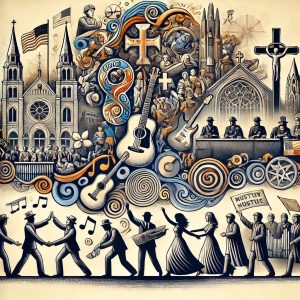 Music has always been a powerful medium for expressing ideas, beliefs, and emotions. Throughout history, songs have captured the essence of societal movements, religious practices, and political ideologies. Today, these themes continue to influence how we create and consume music playlists or free playlist submission. Whether it’s a hymn reflecting spiritual devotion or a protest anthem representing political struggle, music serves as a bridge between the past and present.
Music has always been a powerful medium for expressing ideas, beliefs, and emotions. Throughout history, songs have captured the essence of societal movements, religious practices, and political ideologies. Today, these themes continue to influence how we create and consume music playlists or free playlist submission. Whether it’s a hymn reflecting spiritual devotion or a protest anthem representing political struggle, music serves as a bridge between the past and present.
How Religion Shapes Music Playlists
Religious music holds a timeless quality. It transcends generations and provides a deep sense of connection. From Gregorian chants to gospel choirs, religious music often serves as a reflection of faith and community. Modern playlists often blend these traditional elements with contemporary genres. For instance, spiritual themes appear in pop or indie music, making them accessible to broader audiences. A playlist inspired by religion might include tracks like Leonard Cohen’s Hallelujah, contemporary worship songs, or even instrumental meditations that soothe the soul.
Political Movements and Protest Songs
Music has always been a tool for political activism. Artists have historically used their voices to challenge authority and promote change. During the Civil Rights Movement, songs like Sam Cooke’s A Change Is Gonna Come became anthems of hope. Similarly, Bob Dylan’s The Times They Are A-Changin’ captured the spirit of societal upheaval. Modern political playlists might include tracks addressing climate change, equality, or war, blending older protest songs with newer voices like H.E.R. or Billie Eilish. These playlists remind us how music can fuel collective action and hope for a better future.
History Through Music Playlists
Music often reflects historical events, acting as a time capsule for significant eras. Jazz from the Harlem Renaissance, punk rock from the late 20th century, or folk songs from the Great Depression tell stories of their respective times. A historical playlist might combine these pieces to provide listeners with a sense of how music evolved alongside key moments in history. It’s a way of understanding culture and society by diving into the emotions and stories of the past.
Creating Your Playlist
Curating a playlist combining religion, politics, and history is both challenging and rewarding. It involves selecting songs that resonate on a deeper level while also providing context for their significance. For example, a playlist could include gospel songs like Mahalia Jackson’s How I Got Over, alongside politically charged tracks like Tracy Chapman’s Talkin’ Bout a Revolution. Adding historical layers, such as Nina Simone’s Mississippi Goddam, ties the themes together, creating a rich listening experience.
Music is a universal language that tells stories of belief, struggle, and legacy. Crafting playlists inspired by these themes is an opportunity to reflect on their meaning and impact. Whether for personal enjoyment or as a shared experience, these playlists allow us to connect with humanity’s journey across time.

